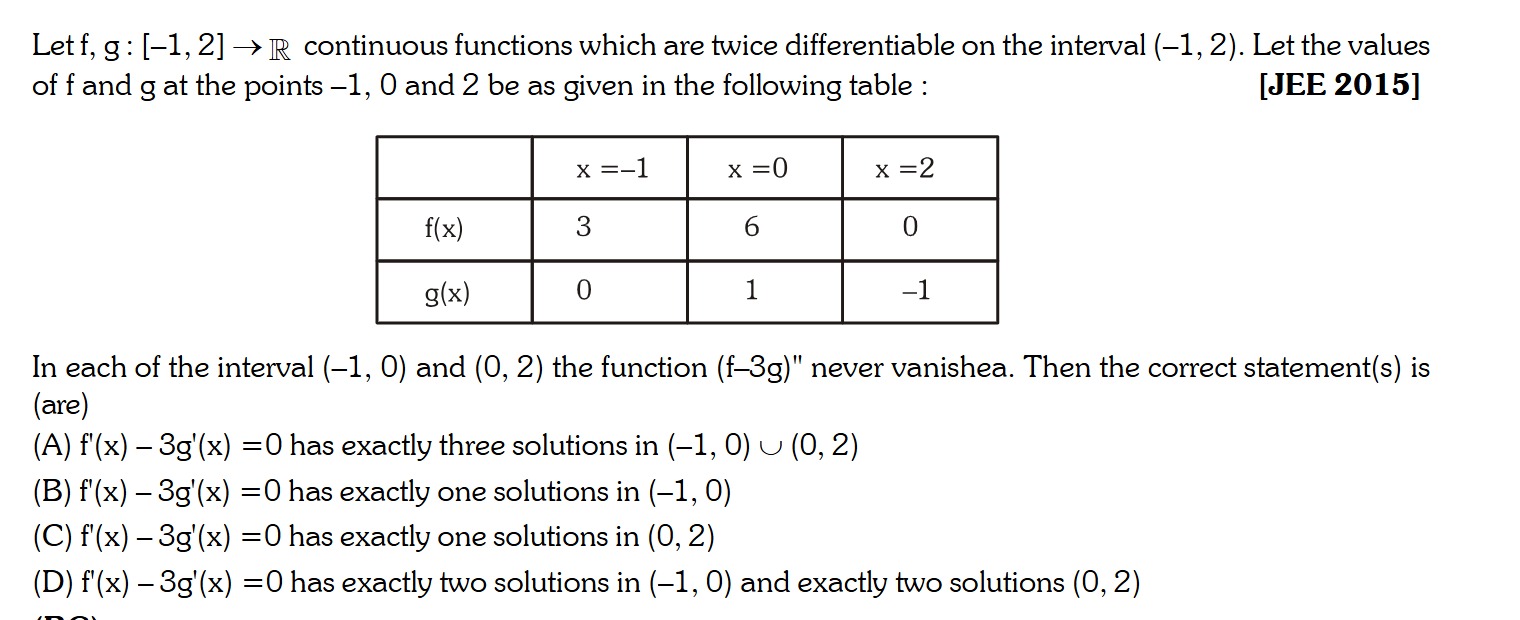Question
Question: Let f, g: [-1, 2] → R continuous functions which are twice differentiable on the interval (-1, 2). L...
Let f, g: [-1, 2] → R continuous functions which are twice differentiable on the interval (-1, 2). Let the values of f and g at the points -1, 0 and 2 be as given in the following table : [JEE 2015]
In each of the interval (-1, 0) and (0, 2) the function (f-3g)" never vanishea. Then the correct statement(s) is (are)

f'(x) - 3g'(x) = 0 has exactly three solutions in (-1, 0)∪(0, 2)
f'(x) - 3g'(x) = 0 has exactly one solutions in (-1, 0)
f'(x) -3g'(x) = 0 has exactly one solutions in (0, 2)
f'(x) -3g'(x) = 0 has exactly two solutions in (-1, 0) and exactly two solutions (0, 2)
B, C
Solution
Let h(x) = f(x) - 3g(x).
First, let's calculate the values of h(x) at the given points x = -1, 0, 2 using the provided table:
- At
x = -1:h(-1) = f(-1) - 3g(-1) = 3 - 3(0) = 3 - At
x = 0:h(0) = f(0) - 3g(0) = 6 - 3(1) = 3 - At
x = 2:h(2) = f(2) - 3g(2) = 0 - 3(-1) = 3
Since f and g are continuous functions on [-1, 2] and twice differentiable on (-1, 2), h(x) is also continuous on [-1, 2] and twice differentiable on (-1, 2).
Applying Rolle's Theorem for the interval (-1, 0):
We observe that h(-1) = 3 and h(0) = 3.
Since h(x) is continuous on [-1, 0] and differentiable on (-1, 0), and h(-1) = h(0), by Rolle's Theorem, there exists at least one value c1 ∈ (-1, 0) such that h'(c1) = 0.
This means f'(c1) - 3g'(c1) = 0.
We are given that the function (f - 3g)'' never vanishes in the interval (-1, 0). This means h''(x) ≠ 0 for all x ∈ (-1, 0).
If the second derivative h''(x) never vanishes in an interval, it implies that the first derivative h'(x) is strictly monotonic (either strictly increasing or strictly decreasing) in that interval.
A strictly monotonic function can have at most one root in an interval.
Since we have already established that h'(x) = 0 has at least one solution in (-1, 0), and h'(x) is strictly monotonic in this interval, it must have exactly one solution in (-1, 0).
Therefore, f'(x) - 3g'(x) = 0 has exactly one solution in (-1, 0). This makes statement (B) correct.
Applying Rolle's Theorem for the interval (0, 2):
We observe that h(0) = 3 and h(2) = 3.
Since h(x) is continuous on [0, 2] and differentiable on (0, 2), and h(0) = h(2), by Rolle's Theorem, there exists at least one value c2 ∈ (0, 2) such that h'(c2) = 0.
This means f'(c2) - 3g'(c2) = 0.
We are given that the function (f - 3g)'' never vanishes in the interval (0, 2). This means h''(x) ≠ 0 for all x ∈ (0, 2).
Similar to the previous interval, if h''(x) never vanishes in (0, 2), then h'(x) is strictly monotonic in (0, 2).
Since h'(x) = 0 has at least one solution in (0, 2), and h'(x) is strictly monotonic in this interval, it must have exactly one solution in (0, 2).
Therefore, f'(x) - 3g'(x) = 0 has exactly one solution in (0, 2). This makes statement (C) correct.
Based on the analysis, both statements (B) and (C) are correct.
Explanation of the solution:
- Define
h(x) = f(x) - 3g(x). - Calculate
h(-1) = 3,h(0) = 3, andh(2) = 3. - Apply Rolle's Theorem to
h(x)on[-1, 0]: Sinceh(-1) = h(0), there existsc1 ∈ (-1, 0)such thath'(c1) = 0. - Apply Rolle's Theorem to
h(x)on[0, 2]: Sinceh(0) = h(2), there existsc2 ∈ (0, 2)such thath'(c2) = 0. - Given
h''(x) = (f - 3g)'' ≠ 0in(-1, 0)and(0, 2). This impliesh'(x)is strictly monotonic in each of these intervals. - A strictly monotonic function can have at most one root. Combining with step 3,
h'(x) = 0has exactly one solution in(-1, 0). - Combining with step 4,
h'(x) = 0has exactly one solution in(0, 2). - Thus,
f'(x) - 3g'(x) = 0has exactly one solution in(-1, 0)and exactly one solution in(0, 2).
